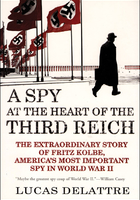RETURN TO BERLIN
Cape Town, October 20, 1939
The port of Cape Town was crowded. Hundreds of Germans were leaving South Africa because they had become undesirable in the country. England and France were at war with the Reich. The member countries of the Commonwealth (India, Australia, and New Zealand) had joined the conflict on September 3. South Africa, after a few days' hesitation and a serious government crisis, had decided to side with London on September 6. General Smuts, in favor of joining the war against Germany, had taken over as prime minister from General Hertzog, who had favored neutrality.
The German community of South Africa was under strict surveillance. Dozens of arrests had already taken place. Many preferred to return home rather than risking internment on the charge of "intelligence with the enemy." But the German liners of the Woermann Linie were no longer authorized to drop anchor in the ports of the Union of South Africa. The great repatriation was thus taking place under a neutral flag. That evening the Bloemfontein, a ship of the Holland Africa Line sailing to Antwerp, was mobbed by people wanting to leave. On the deck of the Dutch ship could be seen Germany's acting consul in Cape Town, Fritz Kolbe. He waved a final farewell to his son. Standing on the dock, the seven-year-old child was dressed in Bavarian style, with gray-green lederhosen and a baggy white shirt. He held the hand of a young woman, and then he hung onto the skirts of an older woman (perhaps his grandmother). The little boy seemed to be saying: "Why are you leaving me?" His gaze was firm and he held back his tears. Fritz knew that he would never forget that look.
The ship headed for the open sea on a journey that, if all went well, would last about two weeks. But submarine warfare was raging between Germany and England, and crossing the English Channel would be dangerous. A naval escort had been provided for the end of the voyage. Anxiety prevailed on board. The passengers gradually went belowdecks. Many went to the radio room to listen to the latest news from Europe. Kolbe remained alone, leaning on the rail. He did not know when he would see his son again. "Was I right to leave?" he asked himself with a pang, but it was too late to reverse his decision. The port had already disappeared over the horizon.
Fritz wondered how he could ever leave South Africa behind. As he watched the splendid shore of the bay drift by, he took with him images of flowering bougainvillea, and he caught a glimpse against the clear night sky of the flat summit of Table Mountain. When he had left Madrid at the end of 1935, he had felt himself to be Spanish. Now he had become an adopted Cape Towner. For the last time he identified the rocky peaks overlooking the sea, the Lion's Head, the Devil's Peak, the Twelve Apostle mountains-a landscape he had traveled through many times at the wheel of his superb automobile, a 1935 Horch 830 convertible. This was a luxury car ordinarily used by members of German high society, and acting consul Fritz Kolbe had used all his savings to buy it. Of all his possessions in Cape Town, his Horch was the only thing that he had insisted on shipping to Berlin (he did not yet know that he would soon have to give it up because of restrictions due to the war).
Fritz thought again of the long drives he had taken in the region, and breathed one last time the warm wind coming off the African veldt. In July 1939, he and a friend had explored the vast territory of South-West Africa and the Kalahari Desert in an all-terrain vehicle. The former German colony of South-West Africa (Südwestafrika or Südwest) was a paradise for antelope hunting. Recalling it now, Fritz remembered the exquisite taste of the wild game, but already a smell of sadly European vegetable soup was rising from the ship's kitchens.
As the African coast slipped by that evening, Fritz Kolbe thought about the harshness of fate. Young Peter's mother, Anita, had died in June 1937. She had never seen Warsaw (where Fritz had stayed for only three months), or South Africa. Fritz had remarried in the fall of 1937; his new wife was Lita Schoop, from Switzerland. Because the ceremony took place in Zurich, they had not received the copy of Mein Kampf now given to all newlyweds in Germany. It was a marriage of reason rather than love: Fritz had been looking primarily for a replacement mother for his son. The couple had come to live together in Cape Town early in 1938. The marriage had not lasted long; they had already been separated for some time when Fritz left Africa. The tension in the couple, evident after only a few months of life together, continued to build during their time in South Africa. One day, Lita had even threatened to denounce her husband's anti-Hitler convictions to the consul. Fritz's immediate superior was a dedicated Nazi by whom Fritz took care to remain unnoticed. After that incident, Fritz had invited a friend home so that he could spend an entire evening feigning obeisance to the "party line" in the presence of his own wife. What an unbearable charade! Very soon afterward, he had slammed the door on the marital home in the upscale neighborhood of Camps Bay (a handsome detached house with a garden), taking his son with him. Lita and Fritz had not seen each other since then. He merely knew that Lita had decided not to return to Europe (he would later learn that she had been interned as a German citizen in a British camp in East Africa).
If Fritz Kolbe had decided to leave, this was purely out of loyalty to the head of the German legation in Pretoria, Rudolf Leitner, who had asked him to return with him. Even though the diplomat was a member of the party, Kolbe respected him as a human being. He was pleased to see him on board the Bloemfontein. The two men knew each other well: In 1936, when Fritz had briefly returned to Berlin after a short stay in Warsaw, Leitner had been his superior in one of the departments of the ministry (Kolbe had been recommended to him by Count von Welczeck, the former ambassador to Spain). Leitner, a good-natured Austrian Catholic, particularly appreciated Kolbe for his habits, "worthy of the finest Prussian administration." Fritz was a veritable workhorse, having no hesitation in working overtime and spending the night at the office when necessary. As for Kolbe, he liked to chat with Leitner, particularly when he talked about America, where he had been posted for more than ten years. As the former consul in Chicago in the mid-1920s, he knew a huge number of amusing anecdotes about Al Capone and the hidden history of prohibition.
When Leitner had been sent to Pretoria at the end of 1937, he had not hesitated to fight to have Fritz Kolbe appointed to the consulate in Cape Town. The mission he had assigned him was to restore order to the consulate's finances, which were in a sorry state after several years of mismanagement. Kolbe had been appointed in spite of the initial hesitations of the powerful liaison office between the Foreign Ministry and the NSDAP, which controlled all foreign appointments. Leitner had had to use all his influence for Kolbe's professional qualities to trump his politically questionable status in the eyes of the liaison office.
Kolbe was something of a "protégé" of Leitner's, and Fritz would have been very distressed to compromise him. If he had decided to stay in South Africa, as some of his friends had advised, he would have been interned until the end of the war-that was one thing-but above all he would have put his immediate superior in difficulty. In Berlin, Rudolf Leitner would have been criticized for having supported a "deserter," which would have put an end to his career. Kolbe decided to return to the ministry, with an aching heart.
It was a sad voyage. Fritz Kolbe had never felt so alone. He did not reply when an unknown traveler suggested they have a drink. He was suspicious, because the ship was full of informers, cheaters, and professional gamblers. Late at night, he could still be seen strolling on the promenade deck, lost in thought. He was trying to imagine Europe at war. He resigned himself to returning to a Berlin under the Nazi yoke.
The capital of the Reich, he thought, must be gloomier than ever. Fritz had heard that the Gestapo had veritable carte blanche to eliminate whoever it wanted with no legal accountability. Patrols would harass passersby on the slightest pretext. Building managers were now in service to the party, ready to denounce the slightest suspect behavior. Fritz remembered the day in 1937 when he had had the misfortune to pass a Nazi leader's car on a broad Berlin avenue. The eminent figure's chauffeur (was it G?ring, he wondered?) had given him a threatening look and followed him for a while, as if to record his license plate. Fritz anxiously anticipated a summons from the Gestapo. Nothing had happened in the end, but he had slept badly for two weeks.
Even if the war was far from popular, a majority of Germans remained in favor of Hitler and thought that he "was going to come through it," as always. How, he wondered, could millions of people see the approaching catastrophe without reacting? How could they accept the curfew and the obligatory food and clothing ration cards? Fritz told himself that it was probably already too late-military hostilities were right around the corner, and public opinion would unite behind the regime out of a patriotic reflex.
The ministry to which Fritz was returning was, worst of all, under Ribbentrop-the man who had just signed a pact with Moscow after having denounced for years "the Russians, our sworn enemies." Fritz had never seen him but had a fairly clear idea of him. The foreign minister had earned the nickname "Ribbensnob" since he had purchased the right to put a "von" before his surname. He was one of the most mediocre leaders of the regime, known for his pathological obsequiousness toward the führer and his brutality to his subordinates. It seemed that the atmosphere in the Wilhelmstrasse offices had seriously deteriorated in the last two years. Everyone was said to be at the mercy of outbursts of anger from the minister, who insulted his interlocutors, not hesitating to call them "idiots" or "wimps." Generally speaking, Ribbentrop-a former sparkling-wine merchant-detested most career diplomats. He wanted to make the Foreign Ministry into a "powerful National Socialist instrument at the service of the Führer," and to do this he had taken control of the ministry by placing reliable men in the key positions. Half of the five hundred high officials in the ministry were already members of the party, and one in ten belonged to the SS.
The shock waves of events in Germany had spread as far as South Africa. In the German consulate in Cape Town, Fritz Kolbe had observed a gradual deterioration of the climate. Afrikaner nationalism seemed to have grown wings thanks to Hitler, and the atmosphere had become electric. The Afrikaners imitated fascist spectacles commemorating their own history. One evening in the fall of 1938, on leaving the consulate, Fritz had encountered a small troop of Grey Shirts, a fascist league modeled on the SA. The young men had greeted him with a Hitler salute. Fritz had pretended to have forgotten something in the building in order to avoid having to talk to them.
The militants of the Afrikaner cause, as always, had chosen the German camp out of hatred for the British. This had already taken place during the Boer War in 1899, and again in 1914. Since Hitler's accession to power, the descendants of Dutch immigrants thought that once again the fate of the Afrikaner volk was in the hands of Germany and more or less openly praised all the victories of the Reich in Europe.
Fritz had seen all kinds at the consulate. Sometimes they had talked to him as though he were a personal representative of the führer. The most moderate of his visitors argued in favor of South African neutrality: "After all, Hitler is no threat to our interests," he often heard. Others openly wanted an alliance with the Reich and proposed returning the colony of South-West Africa to Germany in order to seal this agreement in the name of peoples oppressed by "British imperialism."
The worst had come when Fritz had had to organize a visit to Cape Town by an NSDAP delegation that had come from Berlin to meet with South African counterparts from the New Order (a movement founded by Oswald Pirow), who defended a "Christian nationalist" ideology based on the ideals of blood and soil. This had happened early in 1939. Fritz had been unable to get out of participating in an evening "among comrades" at the city's German club. The reception, naturally accompanied by large quantities of German beer, had featured various songs drawn from the Nazi repertory.
Lüderitz, October 22, 1939
Lüderitz, a port of South-West Africa, was named for a tobacco merchant from Bremen who had set up a trading post there toward the end of the nineteenth century. Liners sailing to Europe called there twenty-four hours after leaving Cape Town. From the deck that morning, Fritz watched the swarm of activity on the pier: herds of sheep, horses, and the transport of freight-impressive quantities of bales of wool, rifles, agricultural equipment, cases of schnapps. Europe was distant, but German was spoken here, and the architecture as well displayed its clearly German origins.
The former colony of the Reich, half desert, had maintained majority German-speaking enclaves like Lüderitz and Swakopmund, populated by Catholic missionaries from the Rhineland, merchants from the Baltic Sea coast, and transplanted German farmers. The Nazis were naturally interested in this region, which they contemplated reconnecting to the Reich in the context of a vast colonial project. Berlin had already appointed the "shadow governors" of the future African empire. The agitation of the Afrikaners in South Africa was vigorously encouraged by certain German circles in the Südwest. Toward the mid-1930s, NSDAP cells had been set up throughout the territory. Swastika flags had been raised here and there. Leaders of the Hitler Youth had come from the Reich with the intention of training overseas imitators. Fritz knew by reputation the German consul general at Windhoek, Walter Lierau, who had arrived in 1939: he was the first diplomat of the Foreign Ministry to have been a member of the SS.
Fritz thought about his son; this was the region where little Peter was going to live during his father's absence, with his adopted family. The child was to live with Otto and Suzi Lohff, a German couple who lived in the town of Keetmanshoop, 250 kilometers in the interior, who were soon to move to Swakopmund, very close to another port, Walvis Bay. Otto Lohff worked for the Metje and Ziegler company, one of the largest German firms in South-West Africa, importers of supplies for construction and public works. Because the local economy needed him, he had not been interned by the South African authorities.
Otto Lohff had rather nationalistic opinions, but he was not a Nazi. Fritz was especially close to Suzi (nicknamed Ui), Otto's wife; in fact, she had become his mistress. After separating from his wife, Fritz had lived in the small boarding house in Cape Town run by Ui's mother, Frau Kahlke. She thought of herself almost as little Peter's grandmother. Fritz found "granny Kahlke" marvelous, knowing everything about his relationship with her daughter and never committing the slightest indiscretion in front of the deceived husband. As a result, he had forgiven her a good deal, starting with her na?ve admiration of Hitler ("She has not set foot in Germany since 1914," he said to himself, "she cannot understand what is happening"). Fritz had promised Ui that he would come for her after the war and take her to live in Germany.
For now, he returned to Berlin alone, because he wanted to spare his son the misfortunes of war and allow him to escape from privation and hunger, of which he still had terrible memories from his experience in Berlin after 1918. Nor did he have any intention of entrusting him to the schoolmasters of the Nazi regime. He knew that the Hitler Youth now called the shots in classrooms. There was no question of leaving Peter in the hands of some brigade, nor any question of seeing him forcibly enlisted in the "Reich labor force" to repair roads or cut wood in the forest.
Sailing toward Europe, Fritz knew that he had already crossed the line in his opposition to the Nazi regime. In Cape Town, he had committed his first illegal act: He had agreed to forge some passports at a friend's request, to save some anti-Nazi refugees from Germany. This friend may have been Toni Singer, an engineer of Austrian origin, a company head, and member of a Masonic lodge. Thanks to him, Fritz had penetrated the secret society a bit and had begun, clandestinely, his personal initiation. He had particularly appreciated the idea that man had to reform himself before attempting to reform the world. Self-improvement should be intellectual as well as physical. "Only mastery of the body opens up the fullness of being," according to a Masonic precept to which Fritz fully subscribed.
Fritz realized, on the ship taking him back to Germany, how estranged he had become from his own country. He was incapable of mixing with the German passengers, some of whom were noisily celebrating the losses inflicted on the British by the U-boats and singing: "Today Germany belongs to us / And tomorrow the entire world." Alone in his cabin, frequently nauseated because of the stormy sea, he thought that there was perhaps already a Gestapo file with his name on it, like those he had personally handled in the Cape Town consulate ("unreliable element, to be watched, regularly socializes with Jews and Freemasons"). In Berlin, he would be forgiven not a single false move. In the best case, he risked being sent to the front. Fortunately, he was appreciated. The invaluable protection of Rudolf Leitner must not fail him. But Fritz was weary of pretending in order to avoid trouble.
There could be no question of fighting against the Nazis. During his preceding stay in the capital of the Reich in 1936 and 1937, he had seen up close the cost of protesting the regime: One of his friends had lost his job with the Berlin city government, two others had been sentenced to two and three years in a concentration camp, another, arrested for "illicit possession of printing material," had committed suicide after being tortured. So many others, whose names he did not know, had disappeared into the camps.
At the same time Fritz knew that it was always possible to "do a little something" in silence and anonymity, as other Germans were doing here and there, each one according to his means. All things considered, it was perhaps better to stay in Berlin and have a foot inside the system rather than choose exile and observe events from the outside. He had spent a little time with German émigré circles in South Africa and had soon wearied of their interminable discussions and their contagious bitterness. But up to what point could he fulfill his obligations as a government official without selling his soul?
To give himself courage, Fritz recalled an expression that he had heard somewhere, although he could not remember exactly where: "Life is not like the game of chess. There are not only black and white pieces. There are gray figures, solitary knights, and equivocal characters who never get caught."
Berlin, November 1939
At seven-thirty in the morning, on November 9, 1939, Fritz Kolbe took up his duties at the ministry. He walked shivering through the capital, a harsh winter looming, and was surprised to observe that life seemed to be going on more or less normally, though the silence on the streets of Berlin was eerie. Shortages, particularly of coal, were beginning to make themselves felt, but there was plenty of bread and potatoes, and people were dressed normally. The Nazi leaders seemed to have prepared well for their war. Submarines were engaged in a violent but distant Kriegsspiel along the British coasts and in the North Atlantic, but Berlin felt rather far from events.
What had changed in Berlin was the color of the city. Apartments and offices were perpetually plunged in darkness. It was now mandatory to cover windows with dark paper in case of enemy bombardment, even if English planes were not flying over the capital and were merely dropping leaflets over the Ruhr. Even by day, windows remained covered. Headlights of buses and automobiles were darkened with black paint except for a one-by-five-centimeter slit. "Darkening" was the key directive in wartime. Posters stuck up everywhere indicated that whoever did not obey the orders to "darken" was subject to severe penalties. Because of the literal darkness, household injuries were on the rise (objects dropped on feet, heads banging against doorways, and so on). The present and the future were also shrouded in absolute obscurity. Everything was done to prevent information from circulating. No one had the right to listen to foreign radio stations (in this case too, offenders were subject to long prison terms). The war could not be seen, but could be listened to in secret. People strained their ears to catch scraps of the BBC's German language broadcasts.
There was no way to escape from the ubiquitous propaganda. The walls were covered with pro-war slogans. "The day when proud Albion collapses will be a day of joy for us," were the first German words to greet Fritz Kolbe at the border, on the train trip from Antwerp to Berlin. New expressions had appeared in everyday speech: Fritz quickly learned that the male population was divided into those with a "u. k. post" (unavailable to the army) and those who were considered "k. v." (available). He hoped with all his heart that he would be considered "u. k.": these two letters were for him the initials of happiness.
Going to the office, Fritz did not yet know what his new assignment would be. He was a little apprehensive about the meeting that soon awaited him with the head of personnel of the Foreign Ministry. Going through Pariser Platz, across from the American embassy, he looked up at the roof of the Adlon Hotel, where an antiaircraft battery had been set up. With his head in the air, he almost collided with a group of passersby having an animated discussion. He caught a few scraps of the conversation: "attempt against the führer," "Munich," "hall." He knew nothing more when he went in at Wilhelmstrasse 76, one of the three entrances to the Foreign Ministry.
One of Fritz's colleagues, encountered by chance in a corridor, quickly brought him up to date. The night before in Munich, a bomb had exploded in the beer hall where the führer had given a speech every year to commemorate the failed putsch of 1923. Seven were dead and sixty wounded. But, contrary to his usual pattern, Hitler had left the room a little earlier than planned. The bomb had exploded at 9:20, only thirteen minutes after he had left.
At the ministry, as everywhere else, the attack was all that was talked about. The flags were at half-staff. There was word of a march in Munich in honor of the seven people killed in the attack. Radio programs were frequently interrupted by special bulletins. The nasal voice of Goebbels commented on the event on the spot and presented the official version of the facts: "Unquestionably, this ignoble act, probably committed by German traitors, bears the signature of the British secret services."
Lost in thought, Fritz wandered through the corridors of the ministry. His eyes went wide when he saw at a distance a junior minister in a dark blue uniform covered with stripes and gold buttons, and wearing a ceremonial dagger on his belt. Aside from that odd surprise ("you'd think we were in an operetta," Fritz said to himself), nothing had changed since 1937. He glanced into the dreary offices of the Foreign Ministry, and found them as dilapidated and underequipped as when he left-still the same brass lamps with green shades, old oil lamps remodeled into electric ones; the same worn carpets on the floor; the same musty odor of old documents-and yet something had changed, an apparently very minor detail: the typewriters had been replaced. They now had a new key so you could type "SS" in Gothic script.
Fritz crossed paths with several old acquaintances, who whispered a word or two about the life of the foreign ministry at war. He learned that Ribbentrop had been consumed by remorse since, contrary to what the minister had anticipated (and loudly proclaimed), England had declared war on Germany. He was told that a legation adviser, Eduard Brücklmeier, had been briefly arrested by the Gestapo for "defeatism," before finally being released. A colleague complained about the fact that foreign diplomats had deserted the ministry. "We only see a few representatives of friendly or neutral countries," he said. "We spend our time trying to understand what is expected of us," added another. "Jurisdictional disputes with other ministries take up all our energy."
After walking down long corridors, Fritz Kolbe finally arrived at the office of the head of personnel, Hermann Kriebel. In the waiting room, he came across one of his old acquaintances, Hans Schroeder, Kriebel's assistant. Schroeder had joined the Foreign Ministry when Fritz had, in 1925. The two men were about the same age and had had their first diplomatic training together. But since then, Schroeder's career-he was wearing the party insignia on his lapel-had been much more dazzling than Fritz's. "Kolbe! How have you been all this time?" cried Schroeder in a sonorous voice, warmly shaking his hand. Fritz was not taken in by the familiarity. He thought he could catch a slight glimmer of satisfied contempt in the eyes of his interlocutor. Briefly, he reported on his eleven years in Spain, his two years in South Africa, and his forced return following the outbreak of the war. "Good, very good," said Schroeder, smiling broadly. "It so happens that I've heard that they've saved a magnificent post for you: consul at Stavanger in Norway. A quiet country! No rationing, a normal life, an interesting post! What do you think?" Fritz was surprised. He had not been expecting such an attractive offer. Rudolf Leitner must have intervened in his favor, or else such a promotion would not have been offered to him. "But you see," Schroeder continued, "there's a small problem: You're not a party member. A few years ago, we could have turned a blind eye to that, but now it's no longer possible. Frankly, don't be an idiot! All you have to do is get your card, and then make a little courtesy visit to certain people who would like to know you better. In short, it's not very complicated: the matter is entirely in your hands, my friend!"
After having what Schroeder said confirmed by the head of personnel, Fritz was stunned. He who had sworn never to become Pg (party member) was now being offered a very handsome post on condition that he deny his convictions! He took two days to make up his mind. With a heavy heart, he decided not to accept the offer, wondering if he was not making a monumental mistake. He knew that nothing interesting would now be offered to him, and he saw himself stagnating for the rest of his life in some obscure back office in the ministry. Worse, he feared his gesture would be interpreted as an affront by Rudolf Leitner. He risked losing in him his only protector. From then on, catastrophe seemed inevitable.
And indeed a few days later Leitner called Fritz into his office. A great surprise awaited him. His former superior in Pretoria had called him in to encourage him to go to Stavanger and to try to persuade him to join the party. Fairly quickly, considering Fritz's arguments, he nevertheless showed some understanding and even seemed to hint at his respect. One might say that he was saluting, without really daring to say it, Kolbe's constancy. "The problem," he said, taking the trouble to escort him to the door of his office, "is that now you are going to be offered something much less interesting, and for now I can't do much for you."
Reassured by Leitner's attitude, Kolbe felt a bit more lighthearted. Staying in Berlin, he would be able to see old friends and take care of his aged mother, who detested the Nazis and could use the company. The priority was to remain himself, "defenseless but not without honor." Walking through the Berlin streets on the way to his hotel-a temporary residence until he could get settled more comfortably-Fritz Kolbe felt torn between pride and despair, between his desire to flee to Norway and the personal integrity he prized. As he walked, he wondered about his fate. He thought with disgust about a Berlin doctor who had just divorced his wife after thirty years of marriage because she was Jewish and "he had not realized what that meant."
Fritz had never felt so deeply nostalgic for foreign capitals. He remembered a mission to Paris in the late 1920s. He had been there for only a few days to deliver diplomatic correspondence, but he had preserved an undying memory of the city. At this very moment, he would have dearly loved to talk to Ernst Kocherthaler, his old friend from Madrid. It was too bad that it was no longer possible to see Don Ernesto. The Kocherthaler family had settled in Switzerland shortly after the beginning of the Spanish Civil War. They had not totally lost touch, of course. They continued to exchange letters, but the postal censorship in Berlin imposed a good deal of discretion. Fritz thought again of the question that Kocherthaler had asked him in the course of one of their conversations in Madrid: "Are you ready for exploits, suffering, sacrifice?" He regretted not knowing how to answer at the time. Now he knew what he would say: Yes, he was ready to make sacrifices, for example, giving up a post as consul. It might not be a spectacular act, but he had remained true to himself.
Fritz had understood, since the interrogation to which he had been subjected in Madrid in late 1935, how useful it could be to appear to be an idiot in order to preserve your freedom. Since that day, the party informers had left him relatively in peace, and suspicion toward him had faded to some degree. Rather than displaying feigned support for the established authorities (like a certain number of senior diplomats more or less opposed to the regime), Kolbe preferred to adopt an ingenuous attitude that fit well with his modest rank. He told himself that by cultivating his image as an obtuse but efficient minor official he would perhaps be left alone, and that the most insignificant post would enable him at least to maintain his dignity.
Berlin, November 21, 1939
Fritz Kolbe had been in his new position for a few days. He was now assigned to the visa and passport section of the ministry, which was under the jurisdiction of the legal affairs department. His mission consisted of delivering authorizations to leave German territory to members of the foreign ministry who had to go abroad. Kolbe had fewer and fewer regrets about the post of consul at Stavanger. Even if his new assignment was not very interesting, it enabled him to remain informed about events and to keep in contact with colleagues. The foreign ministry was a mine of invaluable information. With respect to the coming offensive in the West, Fritz had learned in the course of October 1939 that sixty to seventy divisions of the Wehrmacht had been transferred from Poland to the Rhine. There had also been rumors in the last few weeks that the SS had committed atrocities in Poland.
The name of the man who had attempted to assassinate Hitler in Munich had been made public. He was a thirty-six-year-old carpenter named Georg Elser. Arrested on November 8, the man had confessed after several days of interrogation. The bomb used in the attack was very primitive in design but effective. Heinrich Himmler, the Reichsführer SS, had reaffirmed that the British secret services had been behind the attack. A little later in the day, it was learned that the Gestapo in fact had arrested two high-ranking British espionage agents on November 9 near the town of Venlo on the Dutch-German border. Posing as opponents of Hitler looking to arrange for support from London, its agents had lured the English into an ambush, killing a Dutch intelligence officer in the process. The two British agents had been brought to Germany for interrogation.
Reading this news, Fritz Kolbe was not the only one who thought that Himmler was probably the brains behind the Munich assassination attempt. He thought of a setup. The Nazis, he said to himself, know that this war is unpopular and want to distract the Germans by making them think that the English want war and that the führer is a demigod protected by supernatural powers. On the other hand, if the SS was really behind this faked assassination attempt, how could Hitler have taken the risk of placing himself next to a ticking bomb that might have gone off a few minutes too soon? Suppose Georg Elser had acted alone, as he claimed. Fritz Kolbe would have liked to talk about the event with some of his friends in the ministry. But he was soon made to understand that it was better not to speak openly on the subject, especially if you called into question the analysis authorized by Goebbels.
The Ministry of Propaganda in fact had taken advantage of the event to put on a grandiose spectacle. November 11 had been declared a "day of national mourning." In Munich, ten thousand people had marched in silence past the Nazi-flag-draped coffins of the seven people killed in the attempt. The ceremony had been broadcast live on the radio. The event served more than one purpose, because the party had taken advantage of it to settle some internal scores. Fritz thought of Georg Elser, the young Swabian carpenter who looked like a bum. He then remembered what Toni Singer had said to him in South Africa in the course of his brief Masonic initiation. Toni Singer had spoken to him of the symbolism of the tarot and had told him that the only card without a number, hence excluded from the game, was the Fool. This card was the symbol of the authentic initiate, able to see a world inaccessible to ordinary mortals. It pictured a vagabond, holding a staff in his right hand, his pack over his left shoulder, pursued by a dog trying to bite him, with his eyes turned toward the sky.















